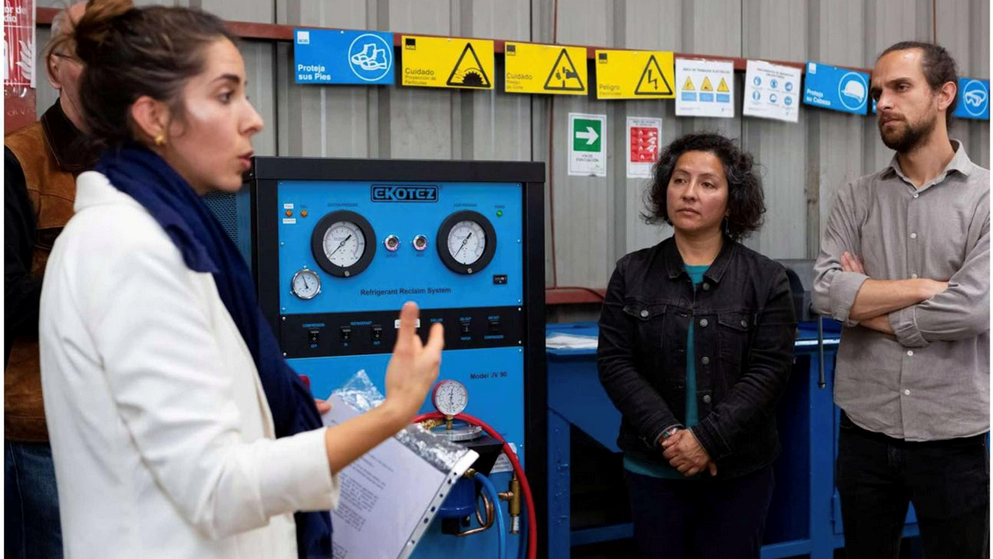

Promoting circularity in refrigerant gases: a climate-friendly cooling solution
20 July 2023 Jayaraj Manepalli

(main photo) On the left, Valeria Arroyave Cardozo, project administrator for UNIDO’s Montreal Protocol Division, at the inauguration of the refrigerant reclamation centre in Puerto Varas, Chile.
There are an estimated 3.6 billion cooling appliances in use today across the world and this number is projected to increase to 9.5 billion by 2050, according to a United Nations Environment Programme report.
Providing cooling for all who will need it in a warming world - and not just those who can afford it - could require 14 billion cooling appliances by 2050!
From their use in houses to the grocery stores, from food supply chain systems to automobiles, refrigeration and cooling devices affect all aspects of modern life. Built into most of these devices is a fluorinated gas, either hydrochlorofluorocarbon (HCFCs) or hydrofluorocarbon (HFCs), which are used as a refrigerant.
When these HCFCs are released into the atmosphere, normally at the end of the life cycle of the device, or due to a leakage, they cause great damage to the environment, leading to the depletion of earth’s ozone layer. If released, both HCFCs and HFCs are also extremely potent climate warmers. They absorb infrared radiation, trapping heat inside the atmosphere rather than allowing it to escape back into space, creating a greenhouse effect that warms the planet.
Globally, the installed base of HCFCs and HFCs is today something to the tune of 24 billion CO2 equivalent metric tons, mostly in use as refrigerants according to a report by the Environmental Investigation Agency. The report also highlights that , with the correct handling of the refrigerants, their recovery and reclamation could help avoid fluorocarbon emissions equivalent to 90 billion metric tons of CO2 by the end of this century.
Recovering these gases and reclaiming them is an important way to fight the climate challenge. The United Nations Industrial Development Organization (UNIDO) Montreal Protocol Division, in collaboration with various member states and partners, has helped set up centres to do just that, most recently in Chile and Ecuador.
“Reclamation is the process of converting the recovered refrigerant into a new product, as per specifications, either by distillation or electrostatic methods, and thus differs from recycling, which removes only a certain level of impurities from the recovered gases,” says Ronald Viskil, an expert working in the field with experience of numerous UNIDO projects.
“The reclaimed product is as good as new, leading to a reduction in costs compared to the purchase of expensive new refrigerant refills. But key to the success of the reclamation centres is having proper legislation and strict implementation in place, and creating awareness of the advantages,” Viskil explains.
Often refrigerants are handled in an unsafe manner leading to their release into the atmosphere, and sometimes banned and counterfeit refrigerants also enter the market, all underscoring the necessity for effective implementation of regulations and law.
Financial and technical support for countries to implement the Montreal Protocol and the subsequent Kigali Amendment requirements is being provided by international agencies like UNIDO. This is leading to the transfer of advanced technologies related to the recovery and reclamation of refrigerants in these countries.
The private sector also plays a key role in setting up the necessary infrastructure for the recovery and reclamation process. Only through a joint climate action from all - from multilateral agencies, national governments, financial institutions, private sector and the civil society - can the challenges of climate change be addressed.

